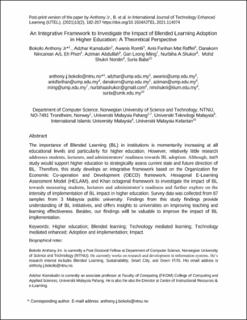| dc.contributor.author | Bokolo, Anthony Junior | |
| dc.contributor.author | Kamaludin, Adzhar | |
| dc.contributor.author | Romli, Awanis | |
| dc.contributor.author | Farihan Mat Raffei, Anis | |
| dc.contributor.author | Nincarean A/L Eh Phon, Danakorn | |
| dc.contributor.author | Abdullah, Aziman | |
| dc.contributor.author | Leong Ming, Gan | |
| dc.contributor.author | A. Shukor, Nurbiha | |
| dc.contributor.author | Shukri Nordin, Mohd | |
| dc.contributor.author | Baba, Suria | |
| dc.date.accessioned | 2021-04-19T07:42:07Z | |
| dc.date.available | 2021-04-19T07:42:07Z | |
| dc.date.created | 2021-04-10T13:16:36Z | |
| dc.date.issued | 2021 | |
| dc.identifier.citation | International Journal of Technology Enhanced Learning. 2021, 13 (2), 182-207. | en_US |
| dc.identifier.issn | 1753-5255 | |
| dc.identifier.uri | https://hdl.handle.net/11250/2738239 | |
| dc.description.abstract | The importance of Blended Learning (BL) in institutions is momentarily increasing at all educational levels and particularly for higher education. However, relatively little research addresses students, lecturers, and administrators' readiness towards BL adoption. Although, such study would support higher education to strategically assess current state and future direction of BL. Therefore, this study develops an integrative framework based on the Organisation for Economic Co-operation and Development (OECD) framework, Hexagonal E-Learning Assessment Model (HELAM), and Khan octagonal framework to investigate the impact of BL towards measuring students, lecturers and administrator's readiness and further explore on the intensity of implementation of BL impact in higher education. Survey data was collected from 87 samples from 3 Malaysia public universities. Findings from this study provide understanding of BL initiatives, and offers insights to universities on improving teaching and learning effectiveness. Besides, our findings will be valuable to improve the impact of BL implementation. | en_US |
| dc.language.iso | eng | en_US |
| dc.publisher | Inderscience | en_US |
| dc.title | An Integrative Framework to Investigate the Impact of Blended Learning Adoption in Higher Education: A Theoretical Perspective | en_US |
| dc.type | Peer reviewed | en_US |
| dc.type | Journal article | en_US |
| dc.description.version | acceptedVersion | en_US |
| dc.source.pagenumber | 182-207 | en_US |
| dc.source.volume | 13 | en_US |
| dc.source.journal | International Journal of Technology Enhanced Learning | en_US |
| dc.source.issue | 2 | en_US |
| dc.identifier.doi | 10.1504/IJTEL.2021.114074 | |
| dc.identifier.cristin | 1903327 | |
| dc.description.localcode | Locked until 8.4.2022 due to copyright restrictions. | en_US |
| cristin.ispublished | true | |
| cristin.fulltext | postprint | |
| cristin.qualitycode | 1 | |
